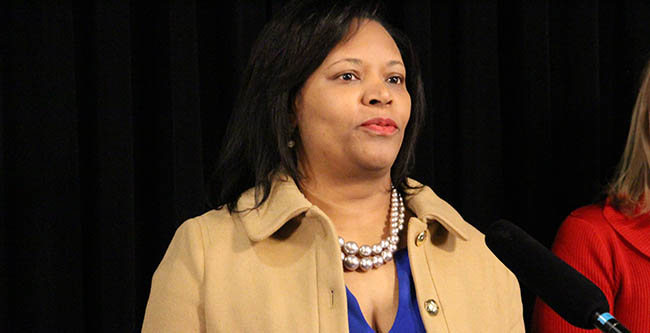
Photo by Matt Schorr
Meharry-Vanderbilt Alliance Executive Director Consuelo H. Wilkins speaks at a press conference held by the Women's Heart Alliance, where the Cities and Communities with Heart Initiative Nashville was announced.
NASHVILLE, Tenn. On Monday, Feb. 27, 2017, the Meharry-Vanderbilt Alliance joined the Women’s Heart Alliance (WHA), Nashville Mayor Megan Barry and country music superstar Martina McBride and others to announce the Cities and Communities with Heart Initiative (CCHI) Nashville, a collaborative, multi-year effort to stop women in Nashville from suffering and dying from cardiovascular disease (CVD). CCHI Nashville is a first-of-its-kind effort to harness the diversity and energy of the Nashville community to make a broad impact on heart disease and stroke among its women.
The effort is led by a six-member community steering committee that includes the Meharry-Vanderbilt Alliance (MVA), WHA, the Office of Mayor Megan Barry, Metro Public Health Department Nashville, NashvilleHealth and Saint Thomas Ascension Health.
MVA Executive Director Consuelo H. Wilkins, MD, MSCI told those gathered at the press conference that health disparities are a key issue with women’s health. “I look forward to working with the Steering Committee and with collaborators,” she said.
The MVA addresses health disparities on an ongoing basis. Recently, it launched the Precision Medicine and Health Disparities Consortium (PMHDC), which utilizes approaches to precision medicine to eradicate disparities among African Americans and Latinos. The PMHDC was made possible by an $11.6 million grant from the National Institutes of Health (NIH).
“We’re honored that Nashville will be the first city in this effort,” Wilkins said after the press conference. “Through the power of partnerships, we believe this community can and will save lives.”
Led by WHA – a national non-profit organization co-founded by Barbra Streisand and Ronald O. Perelman and dedicated exclusively to women’s heart health – the purpose of CCHI is to improve the cardiovascular health of women in up to three mid-sized cities where the CVD burden is high and where stakeholders are ready to take action. WHA selected Nashville as the first city from among 28 other mid-sized cities because of its committed and collaborative leadership in local government, health care, academia, community and faith-based organizations and the private sector.
“The statistics about women’s heart health in Nashville and Davidson County aren’t good,” Wilkins said, echoing Mayor Barry’s comments at the press conference. “But Nashville is taking a big step to improve women’s heart health, and I’m grateful to the Women’s Heart Alliance and our other partners.”
In Davidson County, cardiovascular disease is women’s number one killer[i]. For every one woman who dies of breast cancer, more than eight die from heart disease and stroke. Many people are at risk of heart disease and stroke: 23.2 percent of adults smoke;[ii] nearly one-third (31 percent) are obese; about 1 in 4 (26 percent) adults are physically inactive; 33.6 percent report having high blood pressure; and 33.5 percent say they have been diagnosed with high cholesterol. Additionally, residents in many parts of the city lack easy access to affordable, healthy food.
CCHI Nashville’s five program components will roll out throughout 2017 and include:
- Caring for the Caregiver, a program to improve cardiovascular health and reduce CVD risk factors among nurses in Nashville’s hospitals and health systems;
- A clinical study on pregnancy complications and their link to CVD risk factors and CVD;
- A workforce health initiative through the Office of the Mayor to improve the heart health of female municipal workers;
- A screening and prevention effort in collaboration with Tennessee State University to reduce CVD and its risk factors in younger women; and
- A community initiative centered around one or more health centers and reaching African American, and/or immigrant refugee women.
At this time, other collaborating organizations include: American Heart Association; Association of Women’s Health, Obstetric and Neonatal Nurses; Belmont University School of Nursing; Bernadette Melnyk, PhD, RN, Chief Wellness Officer and Vice President for Health Promotion, The Ohio State University; Cedars-Sinai Medical Center; Council on Gender Equity, Health and Safety Subcommittee, Office of the Mayor; Creative Artists Agency; DVL Seigenthaler; Governor’s Foundation for Health and Wellness; HCA/TriStar Health; Kroger Pharmacy; The Little Clinic; Matthew Walker Comprehensive Health Center; Meharry HBCU Wellness Project’s Student Health Ambassadors; Meharry Medical College Center for Women’s Health Research; Neighborhood Health; The Ohio State University College of Nursing; Siloam Health; Tennessee State University; Tennessee State University School of Nursing; UBER; UnitedHealthcare Community Plan of Tennessee; University Community Health Services; Vanderbilt Heart and Vascular Institute; Vanderbilt University Center for Medicine, Health, and Society; and Vanderbilt University School of Nursing. WHA anticipates additional collaborating organizations will join in the months ahead.
WHA’s national corporate partners are Boston Scientific, Bristol-Meyers Squibb/Pfizer Alliance, Mars Symbioscience and Pfizer.
For more information about CCHI Nashville, please visit: https://womensheartalliance.org/our-work/cities-communities-heart-initi…
About the Meharry-Vanderbilt Alliance
Founded in 1999, the Alliance bridges the institutions of Meharry Medical College and Vanderbilt University Medical Center. Its mission is to enrich learning and advance clinical research in three primary areas -- community engagement, interprofessional education and research -- by developing and supporting mutually beneficial partnerships between Meharry Medical College, Vanderbilt University Medical Center and the communities they serve. Through community engagement, the Alliance serves a large community of stakeholders including surrounding universities and colleges, community organizations, faith-based outlets and community health centers. Its interprofessional education enhances students' interdisciplinary understanding and improves patient outcomes through integrated care. The research conducted provides access to experienced grant writers and materials supporting the grant application process and facilitates grant-writing workshops.



